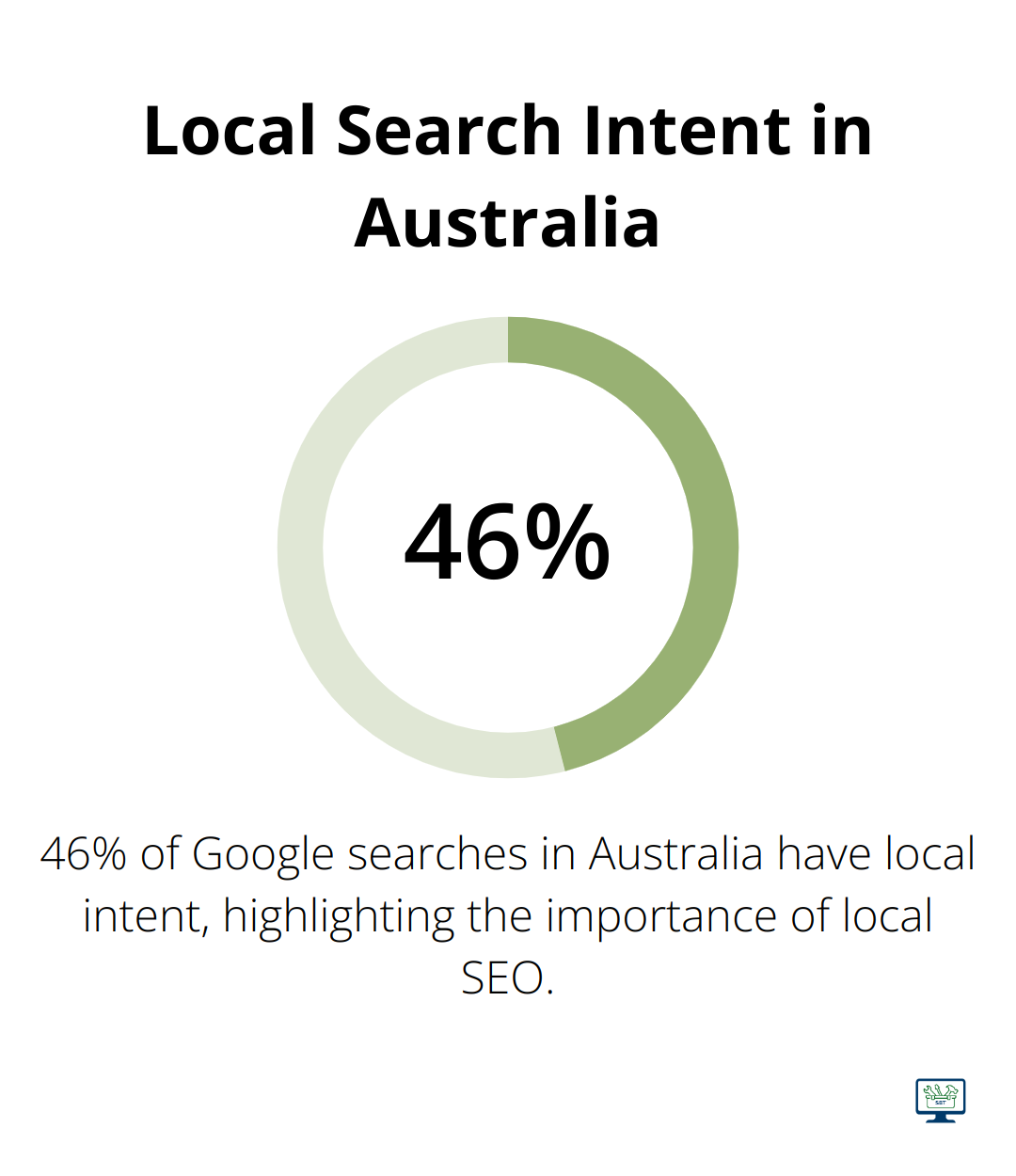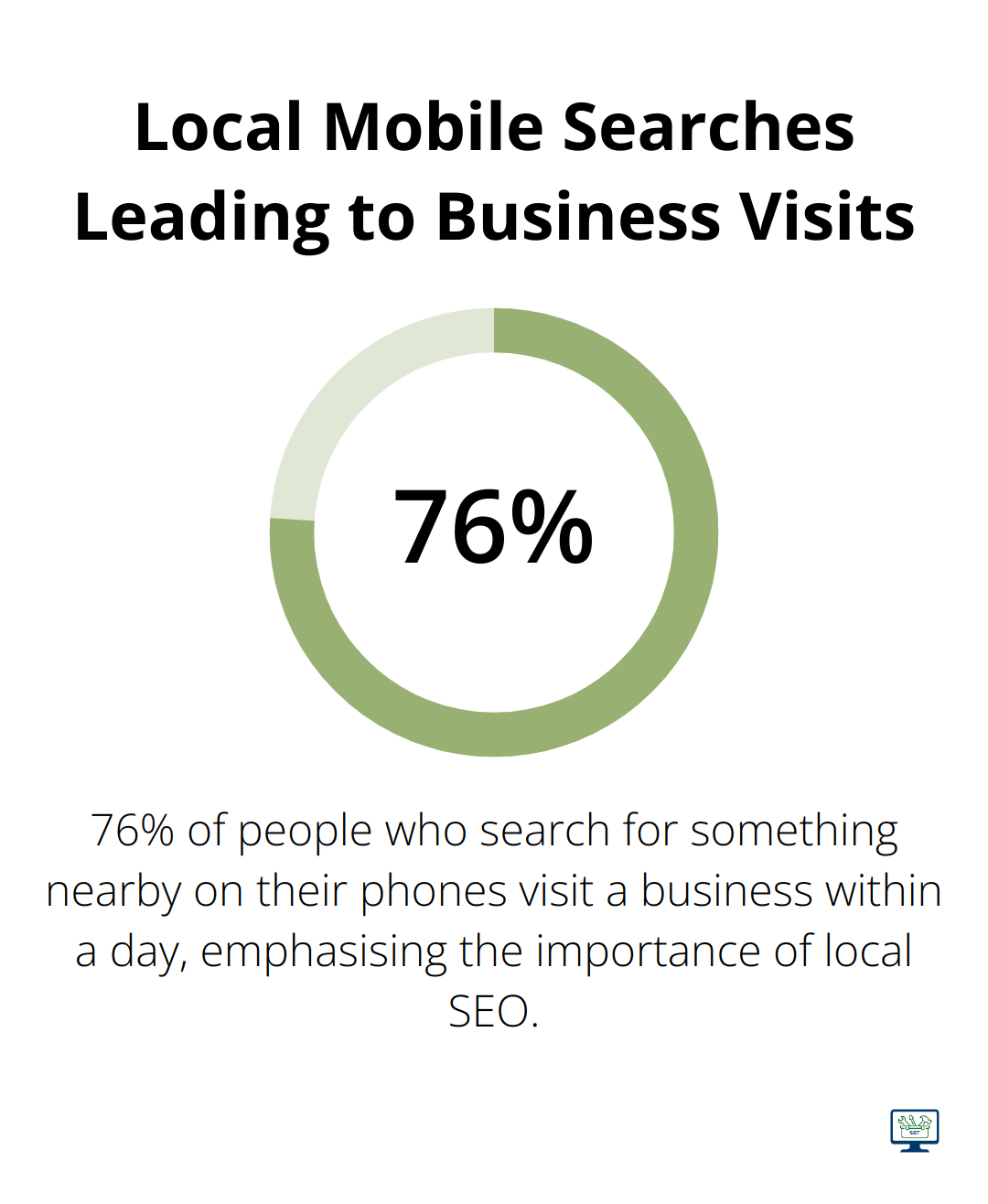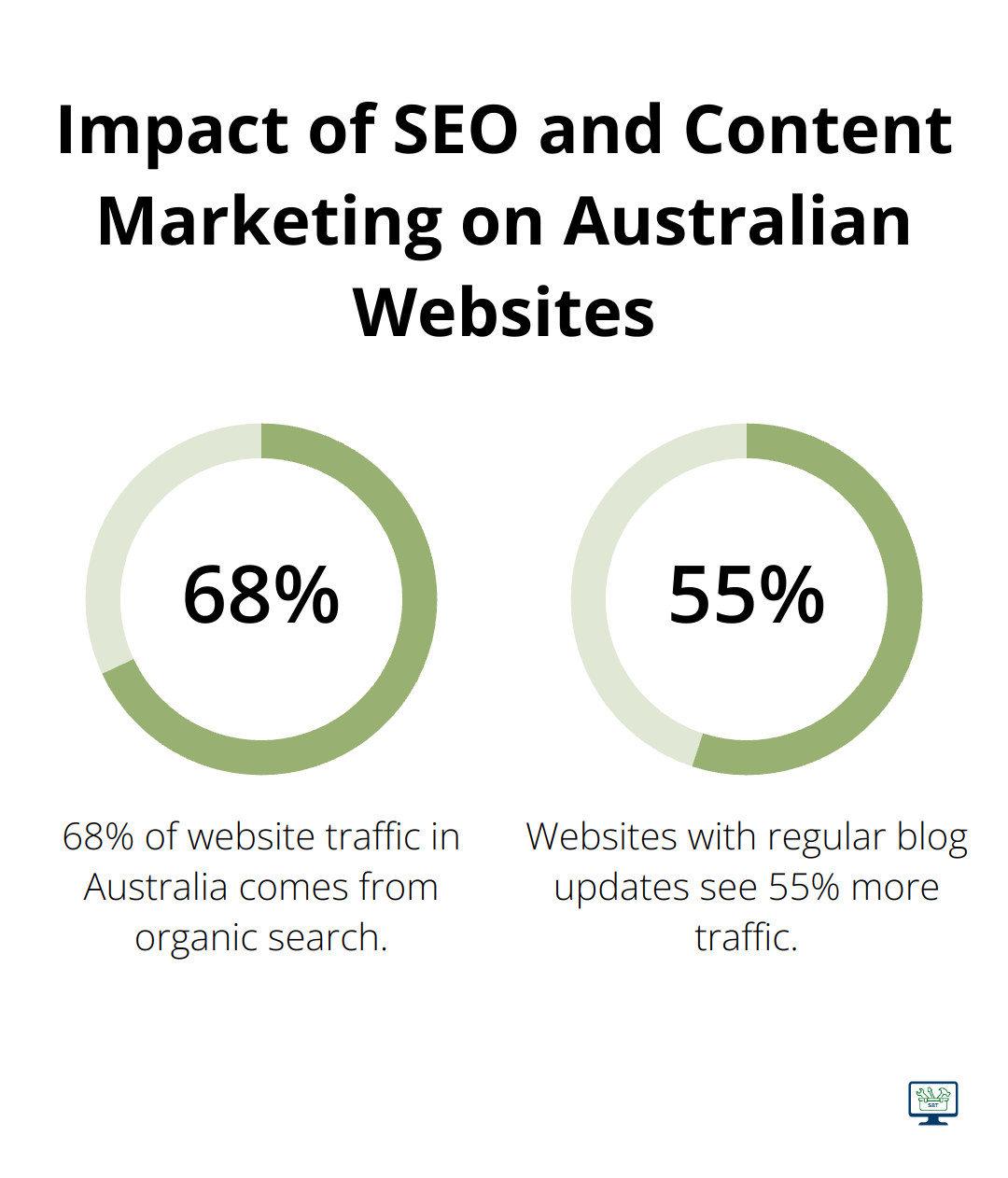How to Boost Your Small Business with SEO Marketing

Published On Aug 07,2025
Small business SEO marketing can be a game-changer for Australian entrepreneurs looking to grow their online presence. At WebsiteStrategies, we’ve seen first-hand how effective search engine optimisation can transform local businesses.
In this post, we’ll explore practical SEO techniques tailored for small businesses in Australia. You’ll learn how to implement these strategies and measure their impact on your bottom line.
What is SEO and Why Does it Matter?
The Essence of SEO for Small Businesses
Search Engine Optimisation (SEO) improves a website’s visibility in search engine results. For small businesses in Australia, it’s a powerful tool to attract more customers without a hefty price tag.
SEO levels the playing field. Unlike paid advertising, it doesn’t require a massive budget to see results. Small businesses can outrank larger competitors by focussing on smart, targeted SEO strategies.
Almost half of Google’s first ten organic results (47%) are business websites. This presents a massive opportunity for small businesses to get in front of potential customers who actively search for their products or services.
Local SEO: A Competitive Edge
For Australian small businesses, local SEO packs a punch. 46% of Google searches in Australia have local intent. Optimisation for local keywords and claiming your Google Business Profile can capture customers in your area who are ready to buy.

Core Elements of Effective SEO
Effective SEO doesn’t rely on tricks or shortcuts. It creates a website that genuinely serves your audience. Here are the key components:
- Quality Content: Write informative, engaging content that answers your customers’ questions.
- Technical Optimisation: Ensure your site loads quickly and works well on mobile devices.
- On-Page SEO: Use relevant keywords in your titles, headings, and content.
- Link Building: Earn backlinks from reputable websites in your industry.
Tracking SEO Performance
SEO isn’t a set-and-forget strategy. It requires ongoing effort and measurement. Tools like Google Analytics and Google Search Console provide valuable insights into your website’s performance.
Some businesses have achieved remarkable results through SEO. One small business saw a 120% increase in Google My Business map actions after implementing SEO recommendations. Another experienced a 692% increase in conversions through comprehensive SEO tactics.
The Long-Term Nature of SEO
You can expect to see search engine results within the first six months if you overhaul an already established website to improve its SEO. It’s a marathon, not a sprint. However, with patience and persistence, SEO can become your most cost-effective marketing channel.
As we move forward, let’s explore the essential SEO techniques that can propel your small business to new heights in the digital landscape. Understanding customer intent has become crucial in developing a strategic SEO approach, helping businesses align their content with what their audience is searching for.
Proven SEO Techniques for Small Business Success
At WebsiteStrategies, we’ve refined our approach to SEO for small businesses over two decades. Our experience shows that success comes from a mix of smart keyword targeting, solid on-page optimisation, local focus, and strategic link building.
Master Keyword Research
Keyword research forms the foundation of any successful SEO strategy. Start by listing terms your customers might use to find your business. Tools like Google Keyword Planner and Ubersuggest can help you uncover related keywords and their search volumes.
Focuss on long-tail keywords – phrases with three or more words. They offer less competition and often yield higher conversion rates. For example, instead of targeting “plumber”, try “emergency plumber in Brisbane”.
Optimise On-Page Elements
On-page SEO extends beyond keyword placement. It creates a seamless user experience. Here are key areas to focus on:
- Title tags and meta descriptions: Craft compelling titles and descriptions that include your target keywords naturally.
- Header tags: Structure your content logically with H1, H2, and H3 tags.
- URL structure: Create short URLs that include relevant keywords.
- Image optimisation: Use descriptive file names and alt text for images.
- Internal linking: Connect to other relevant pages on your site to help users (and search engines) navigate your content.
Dominate Local SEO
For small businesses in Australia, local SEO proves essential. 76% of people who search for something nearby on their phones visit a business within a day.

Start by claiming and optimising your Google Business Profile. Include accurate business information, photos, and encourage customer reviews. Maintain consistency – ensure your business name, address, and phone number match across all online directories.
Create location-specific pages on your website if you serve multiple areas. For instance, if you run a pest control company in Sydney, develop separate pages for “Pest Control in Bondi” and “Pest Control in Parramatta”.
Build Quality Backlinks
Backlinks remain a critical ranking factor. However, quality trumps quantity. A few links from reputable Australian websites in your industry outweigh hundreds of low-quality links.
Try these effective link-building strategies:
- Create valuable, shareable content that naturally attracts links.
- Contact local business associations or chambers of commerce for directory listings.
- Sponsor local events or charities and earn links from their websites.
- Write guest posts for relevant industry blogs or news sites.
Link building requires a long-term commitment. It demands time and effort, but the results prove worthwhile.
As you implement these SEO techniques, it’s important to track your progress and measure the impact on your business. Let’s explore how to effectively measure SEO success and calculate your return on investment in the next section.
How to Measure SEO Success for Small Businesses
Traffic and Engagement Metrics
One of the primary indicators of SEO success is organic traffic growth. Google Analytics provides valuable insights into visitor numbers from search engines. Look for steady increases in organic traffic over time.
Traffic alone doesn’t tell the whole story. Engagement metrics such as time on site, pages per session, and bounce rate offer insights into traffic quality. Improvements in these metrics suggest your SEO efforts attract the right audience.
Conversion Tracking
SEO should drive business results. Set up conversion tracking in Google Analytics to measure actions that matter to your business (e.g., contact form submissions, phone calls, or online purchases). A study found that 68% of website traffic in Australia comes from organic search. Websites with regular blog updates see 55% more traffic.

Keyword Rankings
Keyword rankings still matter. Tools like SEMrush or Ahrefs can track your positions for target keywords. Focus on keywords that drive conversions rather than vanity metrics. For local businesses, tracking rankings for “[service] in [location]” keywords is particularly important.
Return on Investment (ROI)
Calculating SEO ROI can challenge businesses, but it’s not impossible. Start by assigning a value to your conversions. For example, if 10% of your contact form submissions become customers with an average value of $1000, each form submission is worth $100.
Next, compare the value of your organic traffic conversions to your SEO investment. While SEO is a long-term strategy, many businesses see positive ROI within 6-12 months. Some businesses have reported ROIs as high as 300% on average for Australia’s fastest-growing brands.
Adjusting Your Strategy
SEO is not a set-and-forget tactic. Review your data regularly and make adjustments. If certain pages don’t perform well, revisit your on-page optimisation. If your backlink profile doesn’t grow, step up your outreach efforts.
SEO success doesn’t happen overnight. Consistency and patience are key. Focus on these metrics and make data-driven decisions to achieve SEO success for your small business. Tracking your progress over time is essential for any SEO strategy. A well-executed SEO strategy can help your online store climb to the first page of search results for relevant keywords.
Final Thoughts
Small business SEO marketing empowers Australian entrepreneurs to compete effectively in the digital landscape. It offers a cost-effective way to increase visibility, attract more customers, and level the playing field against larger companies. The key components we’ve explored – from keyword research to local SEO – form the foundation of a successful strategy.
SEO demands ongoing effort and adaptation to stay ahead in the ever-changing digital world. Regular content updates, continuous keyword research, and consistent link-building activities will help maintain and improve search rankings. Small business owners should create a comprehensive strategy tailored to their specific needs and goals, focussing on both on-page and off-page factors.
For those feeling overwhelmed, expert guidance can provide valuable support. We at WebsiteStrategies specialise in helping Australian and New Zealand SMEs transform their websites into powerful lead-generating assets (with over two decades of experience in SEO). Our tailored strategies and hands-on support can help you achieve sustainable online growth and thrive in the digital world.
